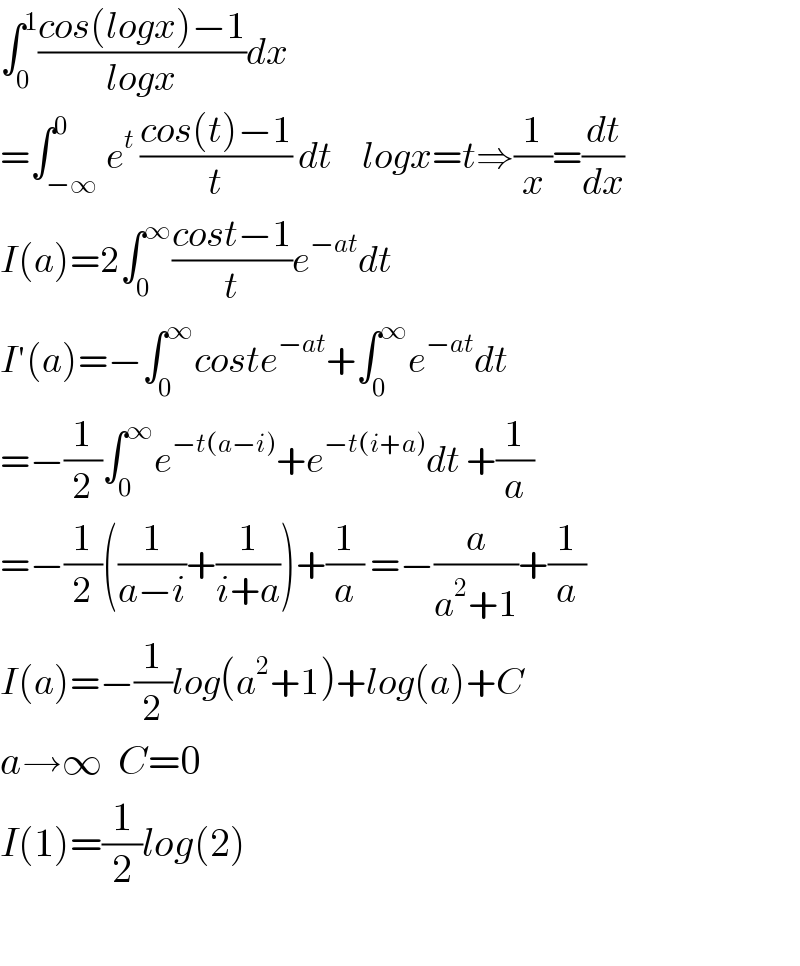
Question and Answers Forum
Question Number 125133 by mnjuly1970 last updated on 08/Dec/20

Answered by mathmax by abdo last updated on 08/Dec/20
![I=∫_0 ^1 ((cos(logx)−1)/(logx)) we do the chamgement logx=−t ⇒x=e^(−t) I=∫_∞ ^0 ((cost−1)/(−t))(−e^(−t) )dt =−∫_0 ^∞ ((cost−1)/t)e^(−t) dt let f(a) =∫_0 ^∞ ((cost−1)/t)e^(−at) dt with a>0 we have f^′ (a)=−∫_0 ^∞ (cost−1)e^(−at) dt =−∫_0 ^∞ e^(−at) cost +∫_0 ^∞ e^(−at) dt but ∫_0 ^∞ e^(−at) dt =[−(1/a)e^(−at) ]_0 ^∞ =(1/a) ∫_0 ^∞ e^(−at) cost dt =Re(∫_0 ^∞ e^(−at+it) dt) snd ∫_0 ^∞ e^((−a+i)t) dt =[(1/(−a+i))e^((−a+i)t) ]_0 ^∞ =((−1)/(a−i)){−1} =(1/(a−i))=((a+i)/(a^2 +1)) ⇒∫_0 ^∞ e^(−at) cost dt =(a/(a^2 +1)) ⇒f^′ (a)=−(a/(1+a^2 ))+(1/a) ⇒ f(a)=lna−(1/2)ln(1+a^2 )+C =ln((a/( (√(a^2 +1))))) +c ∣f(a)∣≤(m/a)→0 (a→+∞) ⇒c=0 ⇒f(a)=ln((a/( (√(1+a^2 ))))) I =−f(1)=−ln((1/( (√2))))=ln((√2))=((ln(2))/2)](Q125135.png)
Commented by mnjuly1970 last updated on 08/Dec/20

Commented by mathmax by abdo last updated on 08/Dec/20

Answered by Dwaipayan Shikari last updated on 08/Dec/20

Commented by mnjuly1970 last updated on 08/Dec/20

Answered by mnjuly1970 last updated on 08/Dec/20
![solution: Ω=Re(∫_0 ^( 1) ((x^i −1)/(log(x)))dx)=Re(ln(1+i)) =Re(ln((√2) e^((iπ)/4) ))=Re[ln((√2) )+i(π/4)] ∴ Ω =((ln(2))/2) ✓](Q125143.png)
Commented by mathmax by abdo last updated on 08/Dec/20

Commented by mnjuly1970 last updated on 08/Dec/20

Commented by mnjuly1970 last updated on 09/Dec/20

